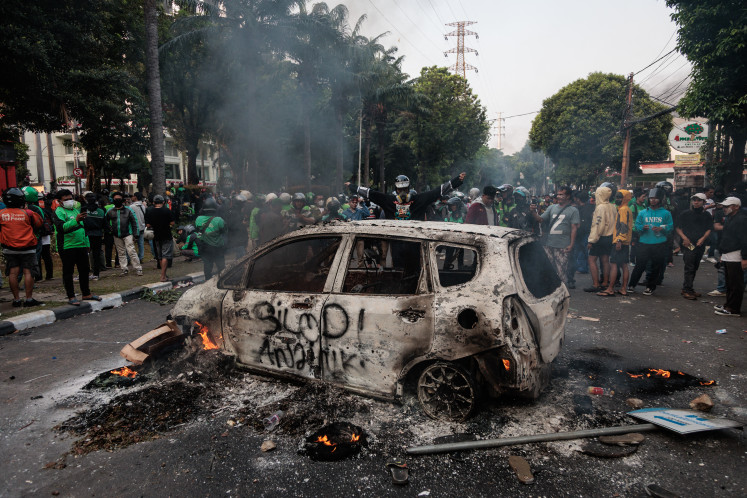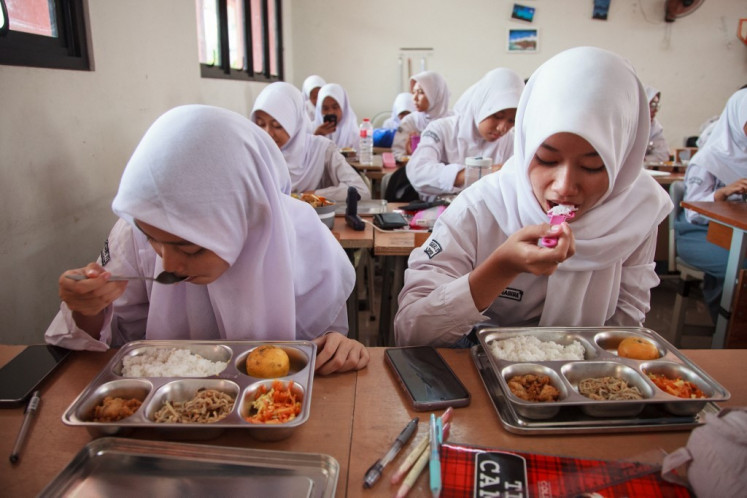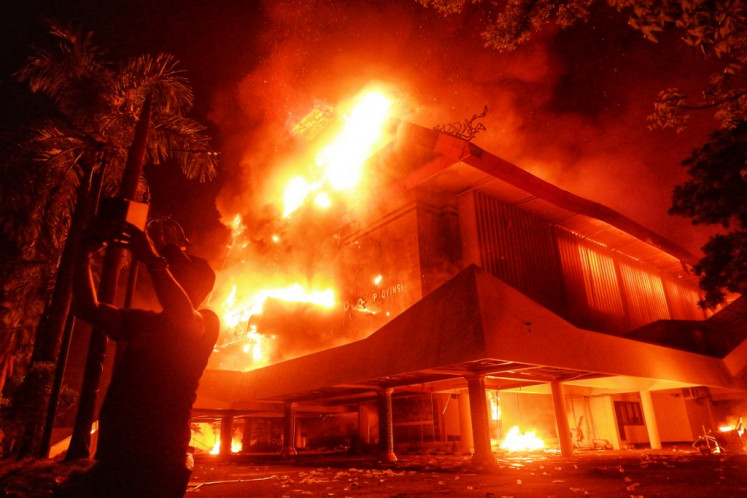Popular Reads
Top Results
Can't find what you're looking for?
View all search resultsPopular Reads
Top Results
Can't find what you're looking for?
View all search resultsIndustry to prepare curriculum for vocational schools
More activities are expected at SMK 2 Bangkalan state vocational school in Madura, East Java, after the school sealed a partnership with Honda motorcycle distributor Mitra Pinasthika Mulia
Change text size
Gift Premium Articles
to Anyone
M
ore activities are expected at SMK 2 Bangkalan state vocational school in Madura, East Java, after the school sealed a partnership with Honda motorcycle distributor Mitra Pinasthika Mulia.
“Under this partnership, we’ve been entrusted with opening a services unit, namely the AHASS Workshop Partner, in the school area,” SMK 2 public relations deputy head M. Fakhrur Rohman told The Jakarta Post on Tuesday.
“On that basis, people who own Honda motorcycles can get routine maintenance work done at our school’s workshop,” he added.
The partnership makes SMK 2 Bangkalan the 19th vocational school in the province to become a Motorcycle Business Technic (TBSM) SMK, the graduates of which will get at least nine international standardized certificates of expertise.
The partnership, Fakhrur went on to say, was expected to improve the abilities of students as the workshop provided hands-on training.
Publicly listed diversified conglomerate Astra International has also been training students to meet industry requirements at its own manufacturer polytechnic, Polman Astra, since 1995.
In other industries, Indonesian Textile Association (API) chairman Ade Sudrajat Usman said the association and the Industry Ministry had signed agreements with 1,200 SMKs to provide work training in the past three years.
“We hire retired workers to become trainers in the vocational schools. We also take the students to the factory to learn about machines. Such opportunities might not be available in schools,” he said on Tuesday.
More such programs and partnerships between vocational schools and industries are expected to come to fruition as the government will team up with industry groups in its effort to revitalize vocational schools across Indonesia.
Education and Culture Minister Muhadjir Effendy said the ministry had been working with the Indonesian Chamber of Commerce and Industry (Kadin) to determine curriculum, students’ competence and certification standards for vocational schools.
“The SMK curriculum will be demand-based, which corresponds with the type of workers that industries need,” he told the press after a meeting at the Office of the Coordinating Economic Minister in Jakarta on Monday. The industries should also provide trainers, he added.
Muhadjir said the students would receive a national or international standardized certificate of expertise aside from a diploma. SMK students, he added, should spend 60 to 70 percent of their time doing internships in the field because many graduates were still underprepared and needed preservice training before starting a job.
According to Statistics Indonesia (BPS), SMK graduates had the highest rate of unemployment in the last three years at 8.63 percent this year, 8.92 percent last year and 9.27 percent in 2017.
The public-private initiative in vocational studies is part of the government's effort to provide better-qualified workers, whose skills match industries’ needs as President Joko “Jokowi” Widodo centered his programs on human capital development.
“We hope this effort can increase labor absorption and boost productivity,” Muhadjir said, adding that the international certificate could enable Indonesians to compete with foreign workers.
He added that low vocational graduate absorption in the workplace was the reason behind a 2016 presidential instruction to revitalize SMKs, in which collaboration with industries and certification were part of the mandate.
The government plans to revitalize 550 SMKs by the end of the year, having allocated Rp 4.3 trillion (US$304.9 million) for the program following the revitalization of 300 vocational schools last year.
“Our target is to revitalize 5,000 SMKs by 2024, but the number is still far from the 14,000 SMKs throughout the country,” said the minister.
As the President is prioritizing human resource development, he has increased the education budget to Rp 505.8 trillion in 2020 from Rp 488.4 trillion this year, some of which will finance the Indonesia Smart Card for University Students (KIP Kuliah) and the pre-employment card program to fund jobseeker training.
The government will also speed up the development of skilled labor by providing double income tax deductions for companies offering vocational training and internship programs and triple tax deductions for expenditure on research and development.
Kadin vice chairman on manpower and industrial relations Anton J. Supit agreed that industry players should prepare the curriculum for future SMK students. However, he expressed doubts that both businesses and vocational studies institutions applied “proper” teaching principles, such as providing a relevant curriculum and certified teachers.
“I urge all industry sectors to open apprenticeships as training grounds so that once the vocational school students graduate, they will be ready to work,” he told the Post. “Vocational students should essentially be working while learning. If they spend most or all of their time in the classroom, the vocational study system will not be effective.”










